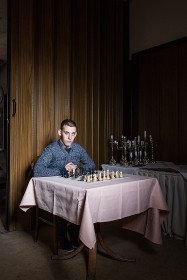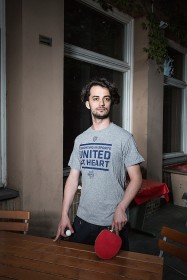The 14th European Maccabi Games (EMG) are taking place in Berlin from 27 July until 5 August 2015. More than 2,000 Jewish athletes from 36 countries will compete in 19 sports from football to fencing to chess. To accompany the games Tamar Lewinsky and Theresia Ziehe are producing a series of portraits with interviews, introducing a new member of the German delegation from Berlin every day here on the blog. They conducted the interviews on the grounds of the TuS Maccabi in Berlin’s Grunewald where Stephan Pramme also shot the portraits.
Leonid Sawlin, 16, chess

Leonid (16) chess © Jewish Museum Berlin, photo: Stephan Pramme
Leonid, why are you participating in the European Maccabi Games?
The games are really fun. I see friends from other cities, and I’m also learning because there are two grand masters here as coaches. They’re teaching me a lot. And of course I’m proud to get to take part in a European championship.
Jewish athletes were barred from the 1936 Olympics. Does that play a role for you, considering that some of the competitions this year are taking place at Berlin’s Olympic Stadium?
That’s hard to explain. Germany tries to deal with its past but at the same time, it’s not possible to make amends for what happened. → continue reading
The 14th European Maccabi Games (EMG) are taking place in Berlin from 27 July until 5 August 2015. More than 2,000 Jewish athletes from 36 countries will compete in 19 sports from football to fencing to chess. To accompany the games Tamar Lewinsky and Theresia Ziehe are producing a series of portraits with interviews, introducing a new member of the German delegation from Berlin every day here on the blog. They conducted the interviews on the grounds of the TuS Maccabi in Berlin’s Grunewald where Stephan Pramme also shot the portraits.
Alex (25), table tennis

Alex (25), table tennis © Jewish Museum Berlin, photo: Stephan Pramme
Alex, why are you participating in the European Maccabi Games?
The first time I went to a Maccabi training course, I got a little closer to my own identity. I grew up in Goslar, a small town where we were the only Jewish family. That’s why the Maccabi program offered a kind of self-discovery, and I found something like a new family there: there was a lot of Russian spoken, which especially gave me a feeling of home because I can’t travel to Russia anymore. (I have duel citizenship so I could be drafted into military service there.) And of course the competition played a role since I was very achievement-minded at the time.
The EMG are taking place in part at a place heavy with symbolism: the Olympic grounds that were erected for the 1936 games, from which Jewish athletes were barred. Does it have a special significance for you that the EMG are happening in Berlin and in particular at the Olympic stadium? → continue reading
During the week of 21 to 27 October 2013, the Academy of the Jewish Museum Berlin, in cooperation with Kulturkind e.V., will host readings, workshops, and an open day for the public with the theme “Multifaceted: a book week on diversity in children’s and young adult literature.” Employees of various departments have been vigorously reading, discussing, and preparing a selection of books for the occasion. Some of these books have already been introduced here over the course of the last weeks.

Unlike German literature for young adults, the range of children’s books on the subject of diversity is still marginal. Usually books about diversity are transposed to the animal kingdom, or they depict ‘alien’ cultures by having foreign children invite their German school friends to an ethnic celebration. The Jewish Passover holiday, the Muslim Eid-al-Fitr, or, alternatively, the Chinese New Year, are described with one and the same formula: mom prepares the celebratory meal, dad explains the origins of the holiday, and the kids watch the central rites until they have to go to bed. Most of these books have no real plot.
Ingke Brodersen chose a different approach: she tells her story from the perspective of a little boy named Sascha, who emigrated from Russia to Berlin. → continue reading


